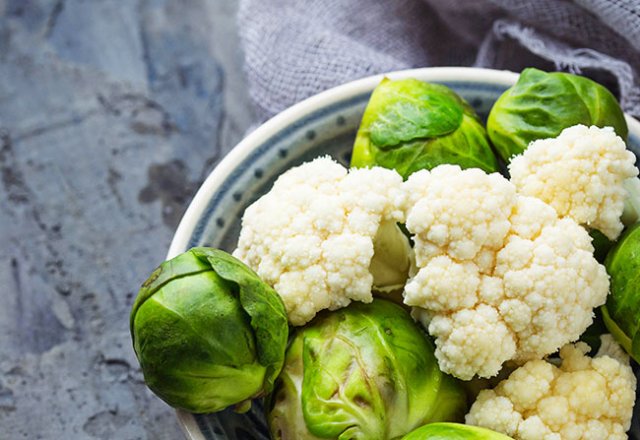
Vital nutrients to support your overall health, mind and body

Nourish from inside out.
When it comes to creating hormonal harmony, food is the foundation. LISA O’NEILL looks at the nutrients you need to best support healthy ovaries and minimise the symptoms that wreak havoc on your mind and body.
When that time of the month rolls around, many of us fall prey to food cravings, intensified emotions and painful cramps – it’s a barrel of laughs, right? But what if we could set ourselves up so that we feel good throughout our cycle and it was as simple as nailing our diet?
There are many hormones produced by the body to do incredible things, such as control blood sugar level (hey, insulin), deal with stressful situations (cortisol, which has a bad rap but is vital in the right quantities) and creating a thriving reproductive system in the ladies (progesterone, oestrogen and testosterone). While they all link up and ping-pong off each other to create the ultimate balance, the female ovarian hormones are particularly important to get right for consistently feeling chirpy, avoiding cramps and lessening cravings.
So why do we so often get slugged with a bag of tears around our period?
According to naturopath Melissa Hohaia from Emerge Naturopathy, a shift in the progesterone and oestrogen levels occurs in the second half of our cycle.
“Low progesterone levels generally make us more prone to food cravings and in the second half of the cycle, progesterone is supposed to be the dominant hormone, so if our levels aren’t high you’ll find yourself ravenous for those sweet treats and all the carbs in the lead up to our menstrual cycle,” explains Hohaia.
Vitamins and nutrients from the food we eat can have a great impact on balancing those hormones, but using food as thy medicine, in this case, requires patience.
“I ask my clients to view their body as a bank account, putting in all the right nutrients consistently so you have a great supply there for times when you need to make withdrawals, like during your menstrual cycle or stressful times,” says Hohaia. “You’re not going to start eating high levels of nutrients for a week and boom, your next cycle is amazing, or [start] taking one dose of fish oil and expecting to feel immediately better. It takes building up and after a month or so of getting the right nutrient levels in, we’d notice a definite improvement.”
So start stocking your fridge with the foods that will make us all serene angels no matter what time of the month it might be.
MAGNESIUM
Ensuring our bodies have a healthy amount of magnesium plays a big role in helping our hormones. Not only does a lacking in magnesium create food cravings in itself, but as oestrogen and progesterone levels elevate in the second half of our cycle, magnesium decreases. So boost that bank account throughout the month with magnesium-rich sources such as leafy greens (spinach, kale, rocket and broccoli), nuts and seeds (pepitas and sunflower seeds are great choices because they’re really high in B vitamins as well as magnesium) and dark chocolate. Your body was right, it did need chocolate after all; just go for options with as much cacao as possible for maximum magnesium content.
B VITAMINS
Of all the B vitamins, B12, B9 – also known as folate – and B6 are the most essential for contributing to a healthy hormonal system and their role in boosting moods. These B vitamins are known to band together to provide a pathway for excess oestrogen to leave the body, therefore without enough of them, we end up with a hormonal imbalance. As B vitamins are water soluble and therefore not stored by the body, we also need to be mindful of consuming them daily. B12 is only found naturally in animal products such as red meat and fish – although many soy products and cereals are fortified with B12 – whereas B6 is more vegetarian-friendly as it’s abundant in leafy greens, papaya, oranges and rockmelon, plus poultry and seafood. B9 or folate can be found in many fruits and vegetables, beans, wholegrains and quinoa.
ZINC
While magnesium is Hohaia’s first mineral looked at for hormonal imbalances, zinc is a close second. “Zinc is important for ensuring egg development and ovulation, which is essential for progesterone production,” says Hohaia. “We need zinc for optimal reproductive health because of the way it allows a woman to utilise oestrogen and progesterone efficiently.”
The body doesn’t store zinc, so a daily dose is recommended to achieve good levels. Oysters are the greatest source, although more readily available food such as red meat and poultry provide the next best dose followed by crab, lobster, chickpeas and cashews.
OMEGA-3 FATTY ACIDS
Omega-3 fatty acids are widely known as essential fats for their role in healthy cell production, but as the body can’t create them, we have to source them from food. Omega-3 fatty acids are often hailed for EPA’s anti-inflammatory effect, but Hohaia says the lesser-known DHA components are excellent for mood and hormonal regulation.
“The DHA component of omega-3 sources, like deep sea fish and flaxseeds for a vegan source, have been shown to really lift moods,” says Hohaia. “So, if we’re a bit down and moody, and prone to PMS, a regular intake of omega-3s will help. To get our levels up, some fish oil supplementation is a good idea too.” Get a good hit of omega-3s including DHA by eating deep-sea fish such as salmon, mackerel and anchovies.
ANTIOXIDANTS
Antioxidants play an important role in progesterone production following ovulation and having a good supply is crucial, according to Hohaia. “Progesterone production comes from corpus luteum, which are the cells left behind after ovulation,” she explains. “Antioxidants play a really important role in keeping those corpus luteum alive, so we can keep producing progesterone for a longer period of time.”
Hohaia recommends seeking out foods bright in colour, which indicates a high antioxidant content, such as berries – goji berries rate the highest on the antioxidant scale, followed by blueberries – tomato, turmeric, beetroot and sweet potato. Dark chocolate is also up there again – not a coincidence, but a sign Mother Nature still loves us.
NO NEGATIVE NIBBLES
If you’re regularly dependent on refined, highly processed foods, it is not going to do you any favours as these options are typically low in nutrients. So sticking with plenty of plant-based wholefoods for the majority of our diets is key. However, Hohaia believes in consuming everything in moderation and states that food cravings can actually work in our favour.
“Recognising a food craving is very powerful, because we can use them as clues to recognising imbalances,” Hohaia says. “However, listen to your body and if sometimes you want a piece of cake, have it, enjoy it and move on but don’t feel bad about it. Women put a lot of pressure on themselves to completely refrain, but it’s all about balance and moderation.”


